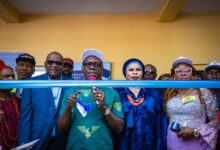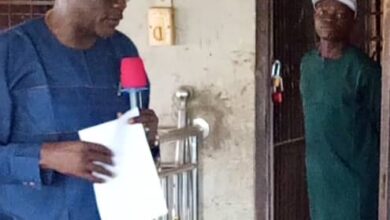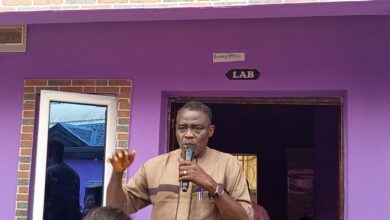Anambra: Thinking Through Nigeria’s Security Conundrum

By Chuka Nnabuife
Even a fool knows the folly of playing the ostrich in security matters. One cannot toy with issues if security and escape unscathed. Insecurity has a profound impact on society, and its consequences are dire.
Anyone who chooses to play blind or pretends not to be concerned will ultimately have himself or herself to blame when the results come. It is terrible but increasingly regrettable that we prefer playing political games with security issues, even when the level of insecurity is worsening and exploding into a disaster across the country. Nobody is safe anywhere again.
I believe that, as a country, Nigeria is currently facing the consequences of her deliberate aloofness in tackling security matters in this Fourth Republic. If we had acted keenly at the early stages of the current security scourge, we would not have arrived at the current impasse. We merely resorted to playing partisan politics when situations that required our standing together in firm resolve came up. We were found cackling to our farts, and throwing gibes at our own expense. Sadly, we still tend to prioritize partisan politics over our land’s general safety.
When, at the turn of the new millennium, some disgruntled boys started abducting expatriate workers at oil rigs in the Niger Delta, we regarded it as no threat but a thrill. They kidnapped oil workers and collected huge ransoms. We sensed no fault. They hindered Nigeria’s crude oil production and supply. We did not react like a country whose economy’s mainstay was being threatened. When they ran short of foreign workers, advanced into picking Nigerians for ransom. They went ahead to be forcefully collecting what they called “development levies” (aka “deve”) from locals who either paid or saw hell. But instead of calling them what they are, we christened the criminal boys in the creeks “Niger Delta militants” and elevated them to the level of core political interest groups. Today, the boys are lords of the manor and dons of the creeks who have their fiefdoms there. Even armed-to-the-teeth government security agents dared not cross their territories. Some of them are even frontline politicians and traditional rulers of communities currently.
Enter another development in the North. How we handled the Boko Haram matter when it emerged in Borno State and its neighborhood over two decades ago led to the vast deterioration we have now. Had we not been so in serious and tardy, the country would not have degenerated to its current baffling state of general insecurity. Some waved the Boko Haram issue aside as a mere Borno State thing but it spread to other states in northern Nigeria. It later evolved into an Islamic “religious” activism matter. Suicide bombing, mass murders, and all manner of terror attacks followed the Boko Haram, yet most of us still appraised it as a mere northern Nigerian Islamic matter. Even comedy shows sold out seats and tables with jokes on the said senseless acts of religious fanaticism. Eventually, it has turned out that we laughed to our peril as the saga worsened in the most macabre manner. Bombing of churches and public events and crazy mass killings became the norm. A trend of hitherto unimaginable destruction, and reign of terrorism, spread from North to South. Nigeria became a global hub of some of the world’s most dreaded terror groups. But because we opt to play with our problems and treat insecurity with escapism and our usual, disastrous “them and us” mindset, we toned down the criminal credentials of the terrorists and dubbed them “bandits.” At some quarters, they were even tagged activists of northern Nigerian rights who should be given state amnesty, the water federal government gave Niger Delta militants amnesty.
Following such kid-glove treatment, a group of land grabbers and cattle rustlers emerged from the North. Named Miyyetti Allah, they canvassed their purpose as shepherding their flocks through pastures across Nigeria but, in reality, the mission was (is) to loot and sack any community they found on their herding paths and occupy. The predominantly Fulani group were also propped as activists of their Fulani nationality rights and requested amnesty while still engaged in their prerogative of killing unarmed farmers and raping women in communities they encountered. The result is that farmers do not go to farms again. The herders who roam the country, fully armed with AK-47 rifles, also resort to kidnapping and armed robbery at nights in hinterlands.
Then we have the criminal elements who came on board under the guise of questing for the actualization of a new state of Biafra. Riding on the excuse of campaigning for Biafra, some rouges, arsonists, criminals, and murderers have turned the southeast into a den of crime. The area has become an axis of terror where kidnapping, vandalism, and killings are common news. Some still call them activists of the Biafra quest, whereas the truth is that hiding under that guise, many said operators have turned into hell.
Without doubt, insecurity has become commonplace in Nigeria. All over the 36 states of the federation and the Federal Capital Territory (FCT) Abuja, killers, kidnappers, robbers are on the prowl. Even security men and law enforcement agencies’ operators have featured among lists of reported culprits in the crimes. Anambra State is not exonerated from orgy of crimes and growing insecurity but it is one state that is visibly working hard to arrest the development with innovative solutions that inculcate residual knowledge. Apart from leveraging on native intelligence, neighborhood watch and re-jigged vigilantê services the state recently created a new ministry for Homeland Affairs for tackling homeland security matters.
While working in deep association with the military and federal law enforcement agencies such as the Police, the Nigerian Security and Civil Defence Corps among others the state has engaged some her citizens who retired from top brass of the military and the Police while also evolving a security architecture that enables communities, private sector and individuals’ partnership in securing their domain.
An example of the latter approach was the partnership between the state government and the late Senator Ifeanyi Ubah through which hitech operational gadgets and necessary facilities were provided to neighborhood watch groups in Nnewi and environs.
In communities like Okija and Uli in Ihiala loca government area (LGA) there are similar partnerships as well as in other places in the state.
Though current economic hardship in Nigeria contributes highly in worsening security situation across country, Anambra remains one state with ingenious approach to making it’s abode safe.
In the security sector, the state’s Governor, Prof. Chukwuma Soludo pursues his government’s mission to make Anambra a “livable and prosperous homeland”. His calls for individuals and organisations to partner his government in developing the state also encompass the sector.
Indeed, all stakeholders in the state’s business and political sectors need to rally around the government as the governor solicits, at least in the area of security because of it’s importance. Playing politics with security with security matters will only make the land that aspires to show the light for other states go the way of the rest which will be unfortunate.
Security is dire. The state is working tirelessly and innovatively to give it the desired attention. Concerned ndị Anambra should keep it out of their partisan politics.









